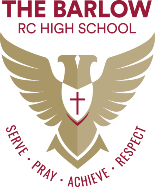History
Curriculum Area: History
Curriculum Leader: Mr Hardy
Additional Staff: Mrs Bremner, Miss Woodward, Mr Carr
Inspirational Quote
‘You always found ways to make me feel like and think as a true historian.’
Sharon Uche
Sharon is a former pupil at The Barlow RC High School. Having graduated in 2018, her words continue to inspire the History department’s work to this day. She reminds us that as teachers, we have great power to help young people to develop their knowledge and understanding of the past, so that they can better understand their place in today’s world.
Curriculum Intent
Our History curriculum will build pupils’ substantive and disciplinary knowledge of the past so that they can contextualise their own lives in the present. We will promote a scholarly attitude to the study of the past through ambitious historical enquiries and in doing so, reflect the diversity within the school community.
Key Stage 3 Curriculum
Our enquiry-led curriculum immerses pupils in a chronological study of the past on an international, national and local scale, using a variety of contemporary sources and interpretations to support learning.
Year 7 pupils begin by asking, ‘Who were the Romans and in what ways did they change the British Isles?’ to enable them to understand the transformative effect that Roman occupation had on parts of the British Isles. They then ask, ‘What was the Norman Conquest and how did it shape the British Isles between 1066 and 1485?’ to empower them to understand why the conquest was a turning point in the history of the British Isles in the medieval period. Finally, Year 7 pupils end the year by building on their existing knowledge of conquest, asking, ‘Who were the Tudor monarchs and what was it like to experience life in Tudor England?’ to inspire an understanding of the diverse range of experiences of those under Tudor rule.
Year 8 pupils begin by asking, ‘In what ways did industrialisation change Britain?’ to enable them to understand the impact of the industrial revolution on Britain and particularly, the city of Manchester; the centre of the ‘Workshop of the World’. Pupils then use the knowledge that they have gained as a foundation for studying the First World War, asking, ‘Was the ‘Great War’ really that great?’ to develop an understanding of how the conflict affected Britain and the wider world in different ways. Finally, Year 8 pupils end the year by asking ‘Why was World War II truly a world war?’ to develop their understanding of the international scale of the conflict by investigating a variety of theatres of war.
Year 9 pupils begin by asking, ‘Who was the Holocaust?’ to enable them to understand who its instigators and victims were, as well as those who were bystanders or supporters of the victims. Pupils then ‘zoom in’ on the causes of the rich diversity in British society, asking, ‘How and why did British society become so diverse?’ This gives pupils the opportunity to connect their prior learning to the theme of diversity. Finally, Year 9 pupils end their Key Stage Three studies by asking, ‘Why is Manchester such an important city in the British Isles?’ to empower them to understand the significant scientific, cultural, musical and sporting contributions that have been made by Manchester to British life.
Key Stage 4 Curriculum
The Edexcel History GCSE course engages pupils with a broad and diverse study of the history of Britain and the wider world.
The units of study covered in the course are:
- Medicine in Britain, c.1250-present
- The British sector of the Western Front, 1914-18: injuries, treatment and the trenches
- Early Elizabethan England, 1558-88
- Conflict in the Middle East, 1945-95
- Weimar and Nazi Germany, 1918-39.
Pupils are robustly examined in three terminal examinations at the end of the course that assess their level of performance in relation to the following assessment objectives:
- Demonstrate knowledge and understanding of the key features and characteristics of the periods studied
- Explain and analyse historical events and periods studied
- Analyse, evaluate and use sources (contemporary to the period) to make substantiated judgements, in the context of historical events studied
- Analyse, evaluate and make substantiated judgements about interpretations (including how and why interpretations may differ) in the context of historical events studied.
Key Stage 4 Curriculum Support Materials
Edexcel GCSE History specification: https://qualifications.pearson.com/content/dam/pdf/GCSE/History/2016/specification-and-sample-assessments/gcse-9-1-history-specification.pdf
Useful revision materials:
https://www.bbc.co.uk/bitesize/examspecs/zw4bv4jhttps://www.brainscape.com/subjects/gcse-history-edexcelhttps://www.tutor2u.net/history/collections/gcse-history-revision-blast-activity-packs-for-edexcel
Progression
Pursuing an interest in the study of History can open up opportunities for careers in academia or education, the civil service or law. The ability to communicate effectively in both oral and written form, the ability to organise material and develop logical arguments, and the ability to use different types of sources to investigate and cross-reference, could also open up opportunities in other areas, including policing or journalism.

